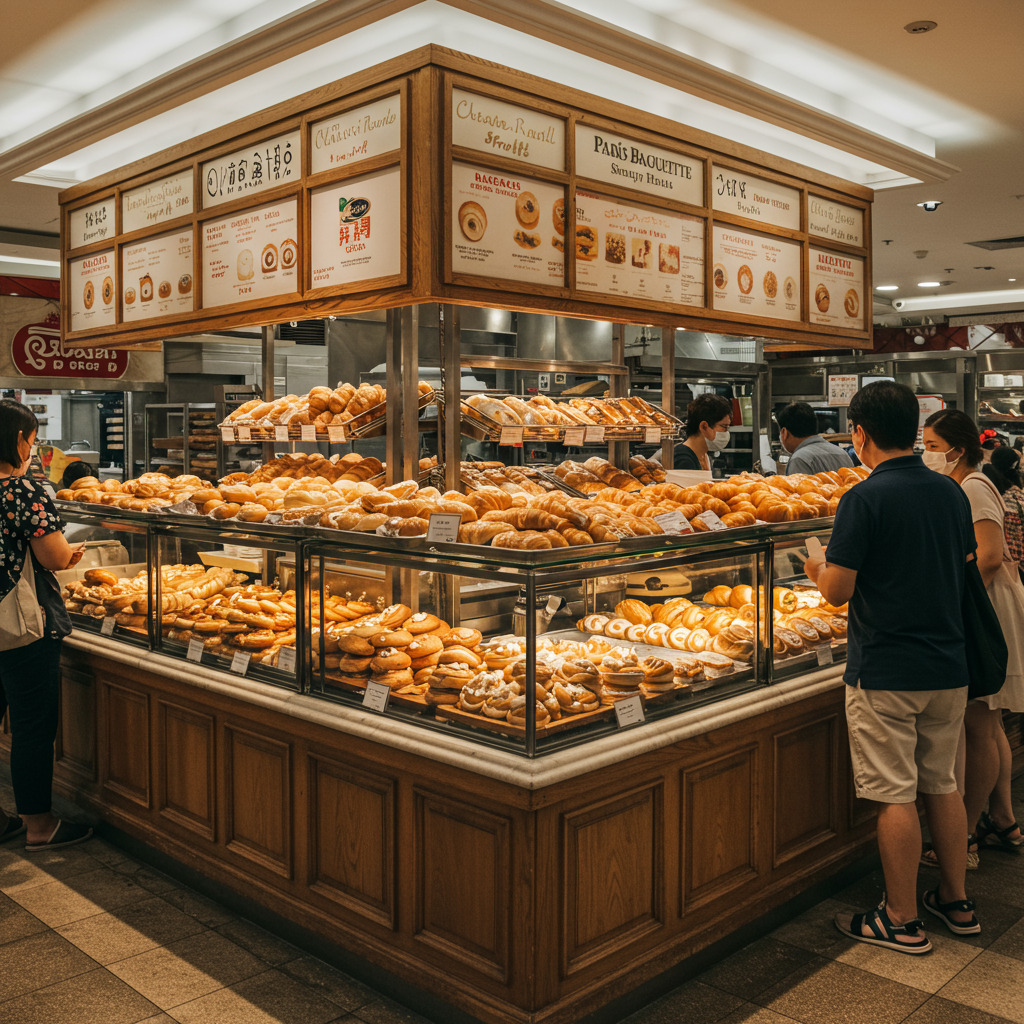Step into the lively basement of a Singaporean mall, and you’re immediately greeted by the irresistible aroma of fresh, buttery baked goods. Amidst the crowds, lines often snake around display cabinets overflowing with cream rolls, milk breads, and inventive filled croissants – a testament to Asia’s burgeoning bakery scene, featuring flavors from across Korea, Japan, Taiwan, and Singapore.
Among the most prominent is Paris Baguette. With a name, decor, and signage (including the Eiffel Tower) that evoke Parisian charm, you might assume it’s French. Yet, this global powerhouse is proudly 100% Korean.
“We are an international brand,” asserts Jin-soo Hur, president and chief executive of SPC Group, the parent company. He challenges the notion that certain baked goods are tied to a single origin. “Like croissants, could you say this is a European product? I would say it’s a universal product.”
SPC Group’s story began humbly 80 years ago with a small family bakery. Today, it’s a dominant force in South Korea’s mass production of bread and pastries, employing 20,000 people and reporting impressive sales exceeding $5.6 billion last year. Paris Baguette itself launched in 1988, marking a significant milestone as the first Korean bakery brand to venture internationally, opening its initial overseas store in China, which remains a vital market.
The brand has since blossomed into a global chain with 4,000 stores spread across 14 countries in Asia, Europe, and the US. Its international ambitions are substantial, targeting over 1,000 new branches worldwide by 2030, with a major push into the United States. To support this growth, a massive production facility is under construction in Texas, slated to be its largest overseas plant upon completion in 2027, supplying North and Latin America. For Mr. Hur, success in the competitive American market would validate Paris Baguette’s standing as a truly international brand.
Part of this global strategy involves connecting food with culture, notably through sports sponsorships. Paris Baguette has partnered with major football clubs like the English Premier League’s Tottenham Hotspur, previously holding a similar arrangement with France’s Paris St Germain. Serving fans on match days, these partnerships link the brand to top-tier sports, reinforcing its own aspiration to be “best in class.”
Behind the scenes, efficiency drives the operation. Mr. Hur notes that bakers often prefer not to endure early mornings of hand-kneading dough. Paris Baguette relies on a system of delivering frozen dough to its global franchises, a method credited with boosting efficiency and extending shelf life.
Asia boasts a rich tradition of baked goods, but rapid urbanization and evolving lifestyles have fueled demand for convenient, on-the-go options. Bakeries in the region cater to diverse palates, offering European classics like pain au chocolat alongside items infused with popular Asian flavors such as pandan, durian, salted egg, red bean, and matcha. Paris Baguette adapts to these regional preferences, even operating a halal-certified plant in Malaysia to serve customers in Southeast Asia and the Middle East.
This blend of tradition and adaptation positions Asian bakeries like Paris Baguette for global success, particularly amid the worldwide fascination with Korean culture, often dubbed “K-mania.” Experts suggest that exposure through screens makes consumers more willing to explore related foods. This willingness is evident in the increasing variety of international baked goods available in markets like the US, ranging from Korean red bean cream buns and mini crodots (croissant-donut hybrids) to Japanese croissant bretzels and Taiwanese marble bread or Thai milk tea puffs, showcasing a global appetite for diverse and sometimes fusion bakery items.
However, the mass-production approach, particularly the use of frozen dough, raises questions about quality compared to artisanal methods. A pastry chef blind taste-tested a croissant made from frozen dough and was critical, noting a lack of honeycomb structure, poor lamination, gluey texture, and absence of butter aroma – calling it “quite bad.” Yet, the chef conceded that artisanal standards aren’t practical for mass-produced goods.
In contrast, tasting a Korean milk bread – a soft, fluffy bun often filled with cream – elicited high praise. The chef described it as “fantastic,” highlighting its pleasant milk smell, refreshing quality, and potential popularity in markets like Europe. This suggests that while production methods may impact certain items, the appeal of unique Asian baked goods remains strong.
Paris Baguette faces significant challenges, including the global economic climate and rising inflation, particularly impacting its crucial US expansion plans. Mr. Hur acknowledges that many businesses are struggling to remain profitable in this environment, citing competitors like Pret A Manger having to drastically change operations and cut jobs.
Despite these hurdles, Mr. Hur insists profit isn’t the sole driver. “If we are only trying to make profit, we’ll just stay in Korea,” he states. The broader vision is to “change the bread culture around the world,” opening bakeries not just for business, but for the benefit of his country and people globally.
Paris Baguette’s journey is a fascinating blend of French aesthetics and Korean innovation, navigating the complexities of global expansion while aiming to make its mark on the universal language of bread.




